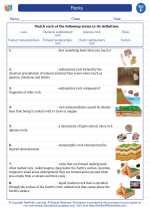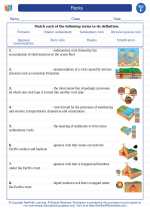Solubility
Solubility refers to the ability of a substance to dissolve in a solvent. The substance that dissolves is called the solute, and the solvent is the substance in which the solute dissolves.
Factors Affecting Solubility
- Temperature: In general, most solid solutes increase in solubility as the temperature of the solvent increases. However, for gases, solubility generally decreases as temperature increases.
- Pressure: Pressure has a significant impact on the solubility of gases in liquids. An increase in pressure generally increases the solubility of gases in liquids.
- Type of Solvent and Solute: The chemical nature of the solute and the solvent can affect solubility. "Like dissolves like" is a general rule, meaning polar solvents dissolve polar solutes and nonpolar solvents dissolve nonpolar solutes.
Units of Solubility
Solubility is often expressed in terms of the amount of solute that can dissolve in a given amount of solvent at a specific temperature. Common units of solubility include grams of solute per 100 grams of solvent, moles of solute per liter of solution, or grams of solute per liter of solution.
Factors Affecting Rate of Dissolving
- Surface Area: Finely ground or powdered solutes have a greater surface area, allowing for faster dissolution.
- Stirring: Agitating the solution increases the rate of dissolving by bringing fresh solvent into contact with the solute.
- Temperature: Higher temperatures generally increase the rate of dissolving by increasing the kinetic energy of the particles, leading to more frequent and energetic collisions between solute and solvent particles.
Examples of Solubility
Some common examples of solubility include:
- Salt (sodium chloride) dissolving in water
- Sugar dissolving in tea or coffee
- Carbon dioxide dissolving in soda
Study Tips
To study solubility effectively, consider the following tips:
- Understand the factors that affect solubility, including temperature, pressure, and the nature of the solute and solvent.
- Practice calculating solubility using different units and understanding the significance of those calculations.
- Experiment with different solutes and solvents to observe and understand their solubility behavior.
- Review common examples of solubility in everyday life to reinforce your understanding.
◂Science Worksheets and Study Guides Sixth Grade. Rocks
Study Guide Rocks
Rocks  Activity Lesson
Activity Lesson Rocks
Rocks  Worksheet/Answer key
Worksheet/Answer key Rocks
Rocks  Worksheet/Answer key
Worksheet/Answer key Rocks
Rocks  Worksheet/Answer key
Worksheet/Answer key Rocks
Rocks  Worksheet/Answer key
Worksheet/Answer key Rocks
Rocks  Vocabulary/Answer key
Vocabulary/Answer key Rocks
Rocks  Vocabulary/Answer key
Vocabulary/Answer key Rocks
Rocks  Vocabulary/Answer key
Vocabulary/Answer key Rocks
Rocks 

 Activity Lesson
Activity Lesson
 Worksheet/Answer key
Worksheet/Answer key
 Worksheet/Answer key
Worksheet/Answer key
 Worksheet/Answer key
Worksheet/Answer key
 Worksheet/Answer key
Worksheet/Answer key
 Vocabulary/Answer key
Vocabulary/Answer key
 Vocabulary/Answer key
Vocabulary/Answer key
 Vocabulary/Answer key
Vocabulary/Answer key

The resources above cover the following skills:
EARTH AND SPACE SCIENCE
Earth’s Systems
Plan and carry out investigations that demonstrate the chemical and physical processes that form rocks and cycle Earth’s materials (e.g., processes of crystallization, heating and cooling, weathering, deformation, and sedimentation).